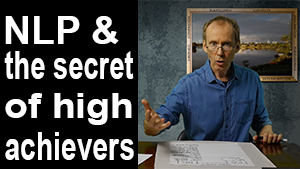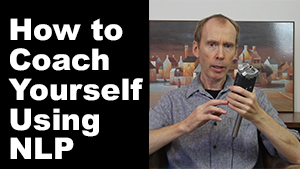
If you can understand how to elicit values - how to use values in your everyday language - and most importantly how to elicit and utilise 'stay/go' values then you have a lot of power. Phone Abby Eagle on 07 5562 5718 or send an email to book a free 20 minute telephone or Skype consultation. Neuro Linguistic Programming (NLP) coaching session - Skype sessions - or face-to-face on the Gold Coast, Robina..
How to Find Your Values Using NLP
By Abby Eagle (2019)
Click the Image to Watch on YouTube
In this article I am going to show you how to elicit your own value systems. We hear people talk about values but what are values? Values are frames of mind that motivate you towards or away-from a behaviour. As such the more you know about them then the more you have control over your own destiny.
Eliciting values is fun and it reveals an awful lot about why you do what you. So if you want to be an amazing success in manifesting your dreams then focus in.
Okay so take a piece of paper and have pen in hand.
Values are context dependent. That means you have to elicit values for each context that is relevant. Some contexts are life, relationships, career, business, health, sport – even down to buying a product such as a car – or going on a date. In some cases we call them values – in others we call them criteria. Either way they influence the decisions that you make or don’t make.
How To Elicit Values
Start by deciding upon a relevant context. In the following example the context is ‘career’.
We start by asking the question: what is important to you in an ‘x’? Where ‘x’ is the context. So in this case we ask the 43 old female client, what is important to you in a career?
Now keep in mind that the secret to accurate values elicitation is to ask intelligent questions and answer them honestly, without interpretation or rationalisation by the conscious mind. Typically we take the first thing the person says. Which could be a single word like ‘family’ or a phrase like ‘helping people’. Write down the exact words that the person says – don’t paraphrase and reinterpret what they say or you will mess it up. The same goes for eliciting your own values – just write down the exact thought that comes to mind.
So in the example below I asked the question: what is important to you in a career and she says ‘respect’.
So I write down the word ‘respect’. Then I ask and what else is important to you in a career? And she answers ‘helping people’. So I write that down under the word respect. Then I ask and what else is important to you in a career and she replies, ‘being a good team leader’. So I add that to the list.
So you keep on asking the question, what is important to you in a career until she runs out of answers. And then ask and what are the emotions that are important for you to experience on a consistent basis. Write down the answers.
So we get a list of values.
Respect
Helping people
Being a good team leader
Solving problems
Morality / ethics
Travel
Independence
Prosperity / money
Satisfaction
Working in service industry
Worthwhile causes
Recognition
Belief products / service
Rank the values in order of importance.
The next step is to rank the values in order of importance. So we get the client to look at the list and then we ask, if in any one day you could only have one of these which would it be? She replies, prosperity / money. So we cross that off the list and start writing a new list. Then we ask, if you could get ‘prosperity and money’ and one more then what would it be? Cross it off the first list and add it to the second. Then say, and if you could get prosperity and money, and satisfaction, and one more what would it be? Continue until you have ranked the entire hierarchy of values.
1. Prosperity / money
2. Satisfaction
3. Respect
4. Independence
5. Recognition
6. Helping people
7. Belief in product / service
8. Being a good team leader
9. Worthwhile causes
10. Morality / ethics
11. Solving problems
12. Travel
13. Working in service industry
Check for values alignment.
The next step is to check for values alignment by running the entire hierarchy through a piece of content, and calibrating the feedback. In the case of this woman I role modelled as an employer with her as a prospective employee, by feeding the values back to her in sequence as follows:
"My company has an opening for a new employee and I think you may fit the criteria. In fact in this job you'll be able to earn a lot of money and become very prosperous and I think this may give you a lot of satisfaction because not only will you gain respect you'll have the independence that I know is very important to you. This means you'll get the recognition that comes from helping people. What's more the service and products that we market will give you the opportunity to become a good team leader for our worthwhile cause. We require someone like you that has a sense of morality and ethics, is good at solving problems and likes the opportunity to travel while working in the service industry. Are you interested?" She replied, 'Yes".
When you feed information back to someone within their value system it becomes very attractive and difficult for them to resist.
What you may have noticed is that I presented her list of values from the most important down to the least important. You can also feed them back in reverse order – that is starting at the bottom and finishing at the top. Try it both ways and see which gets the strongest response.
Now it’s your turn to elicit your towards values.
1. I suggest that you elicit your values in the context of life, relationships, friends and colleagues, career or business, lifestyle, where you live, and an environment in which you would flourish.
2. You ask the question what is important to you in that context?
3. When you run out of responses you ask, and what are the emotional states that are important for you to experience in that context?
4. Then rank the values into a hierarchy. This is the towards values hierarchy.
Elicit away-from values.
Once you have your towards values you need to get an idea of your away-from values. This is what you move away from.
1. Ask, what is important for you to avoid in that context? What else is important for you to avoid in that context. Get an exhaustive list and rank it in order of importance.
Stay-Go Values
Stay-go values give you some real important information.
Let’s say all your values are being met in a context – then what would get you to leave? This gives you the ‘go’ value. For example, the business you are involved in is hurting people.
Then you ask, so let’s say you have decided to leave that context – then what would get you to stay even though the ‘go’ value still exists? This will give you the stay value. For example, getting a pay increase. So a pay increase over rides hurting people.
Then you ask – given the above situation that all your values are being met – you decide to leave but then something happens such that you decide to stay even though the ‘go’ value still exists what would now get you to leave – even though you are getting paid more? This gives you the final exit value that takes the person over threshold – and they say, enough is enough.
Map out the meaning.
The next step is to map out the meaning associated with the values by asking meta questions. The meta questions do not have to be asked in a linear fashion, you can ask them in any sequence. Most importantly ask open ended questions with a sense of curiosity and fascination. Over time your intuition will guide you in the most appropriate questions to ask. So looking back at the previous values hierarchy we might ask:
What would prosperity and money mean to you?
The client might answer – freedom.
So we could ask and what would freedom allow you to have and to get?
They might answer – the freedom to create the life of my dreams.
We could ask – and what specifically would that look like and sound like, which is chunking back down – or we could ask – and why is the freedom to create the life of your dreams important to you? Or we could just ask and what would that mean to you? This would chunk up to a higher level of abstraction – to an over arching frame of mind.
Some questions you might like to explore are:
- What is important to you in an 'x'? (Where 'x' is the subject or context.)
- What else is important to you? What else? What else?
- What is important to you about that?
- Why is that important to you?
- What does that mean to you?
- What do you think about that?
- What do you believe about that?
- Can you tell me more about that?
- What do you feel about that?
- Once you get to experience that then what do you get to have and to experience?
- Is that important to you?
Summary
If you are really serious about achieving success at the highest level and taking control of your life then I invite you to work through the exercises in this NLP article a number of times. Practise eliciting the values of your friends and the people that you engage with. Ask meaning questions. Most importantly sit down and elicit your own values so that you discover why you do what you do – such that step-by-step you get to bring your dreams into reality.
If you want some help in eliciting your values and creating the future of your dreams then feel free to contact me – Abby Eagle using the contact form - top right of this page.
References
I wrote this article from memory but some of the most significant references may be listed below:
- Dilts, R., Hallbom, T., Smith, S., Beliefs: Pathways to Health and Well-Being. Portland, Oregon: Metamorphous Press, 1990.
- Massey, M., The People Puzzle: Understand Yourself And Others. Reston, Virginia: Reston Publishing Co, Inc. 1979.
- Robbins, A., Awaken The Giant Within. New York: Simon and Schuster, 1991.
- Graves, Professor Clare,
- Tad James.
- See the bibliography.
Share With Friends
| DISCUSSION GROUPS | |
|---|---|
 |
|
| NLP Future Selfing | |
| NLP, Hypnotherapy & Meditation | |
| NLP Peace Mapping | |
| Facebook Discussion Group | |
| The secret of high achievers |
|---|
 |
| How to build a powerful team |
 |
| Learn the NLP Meta Model |
 |
| How I stopped drinking alcohol. |
 |
| How to coach yourself using NLP. |
 |




